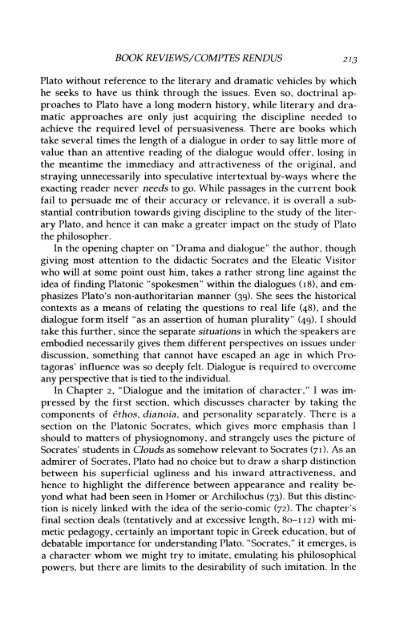OUSEION - Memorial University's Digital Archives Initiative ...
OUSEION - Memorial University's Digital Archives Initiative ...
OUSEION - Memorial University's Digital Archives Initiative ...
You also want an ePaper? Increase the reach of your titles
YUMPU automatically turns print PDFs into web optimized ePapers that Google loves.
BOOK REVIEWS/COMPTES RENDUS 213<br />
Plato without reference to the literary and dramatic vehicles by which<br />
he seeks to have us think through the issues. Even so. doctrinal approaches<br />
to Plato have a long modern history. while literary and dramatic<br />
approaches are only just acquiring the discipline needed to<br />
achieve the required level of persuasiveness. There are books which<br />
take several times the length of a dialogue in order to say little more of<br />
value than an attentive reading of the dialogue would offer. losing in<br />
the meantime the immediacy and attractiveness of the original. and<br />
straying unnecessarily into speculative intertextual by-ways where the<br />
exacting reader never needs to go. While passages in the current book<br />
fail to persuade me of their accuracy or relevance. it is overall a substantial<br />
contribution towards giving discipline to the study of the literary<br />
Plato. and hence it can make a greater impact on the study of Plato<br />
the philosopher.<br />
In the opening chapter on "Drama and dialogue" the author. though<br />
giving most attention to the didactic Socrates and the Eleatic Visitor<br />
who will at some point oust him. takes a rather strong line against the<br />
idea of finding Platonic "spokesmen" within the dialogues (18). and emphasizes<br />
Plato's non-authoritarian manner (39). She sees the historical<br />
contexts as a means of relating the questions to real life (48). and the<br />
dialogue form itself "as an assertion of human plurality" (49). I should<br />
take this further. since the separate situations in which the speakers are<br />
embodied necessarily gives them different perspectives on issues under<br />
discussion. something that cannot have escaped an age in which Protagoras'<br />
influence was so deeply felt. Dialogue is required to overcome<br />
any perspective that is tied to the individual.<br />
In Chapter 2. "Dialogue and the imitation of character." I was impressed<br />
by the first section. which discusses character by taking the<br />
components of ethos. dianoia. and personality separately. There is a<br />
section on the Platonic Socrates. which gives more emphasis than I<br />
should to matters of physiognomony. and strangely uses the picture of<br />
Socrates' students in Clouds as somehow relevant to Socrates (71). As an<br />
admirer of Socrates. Plato had no choice but to draw a sharp distinction<br />
between his superficial ugliness and his inward attractiveness. and<br />
hence to highlight the difference between appearance and reality beyond<br />
what had been seen in Homer or Archilochus (73). But this distinction<br />
is nicely linked with the idea of the serio-comic (72). The chapter's<br />
final section deals (tentatively and at excessive length. 80-112) with mimetic<br />
pedagogy. certainly an important topic in Greek education. but of<br />
debatable importance for understanding Plato. "Socrates." it emerges. is<br />
a character whom we might try to imitate. emulating his philosophical<br />
powers, but there are limits to the desirability of such imitation. In the

















